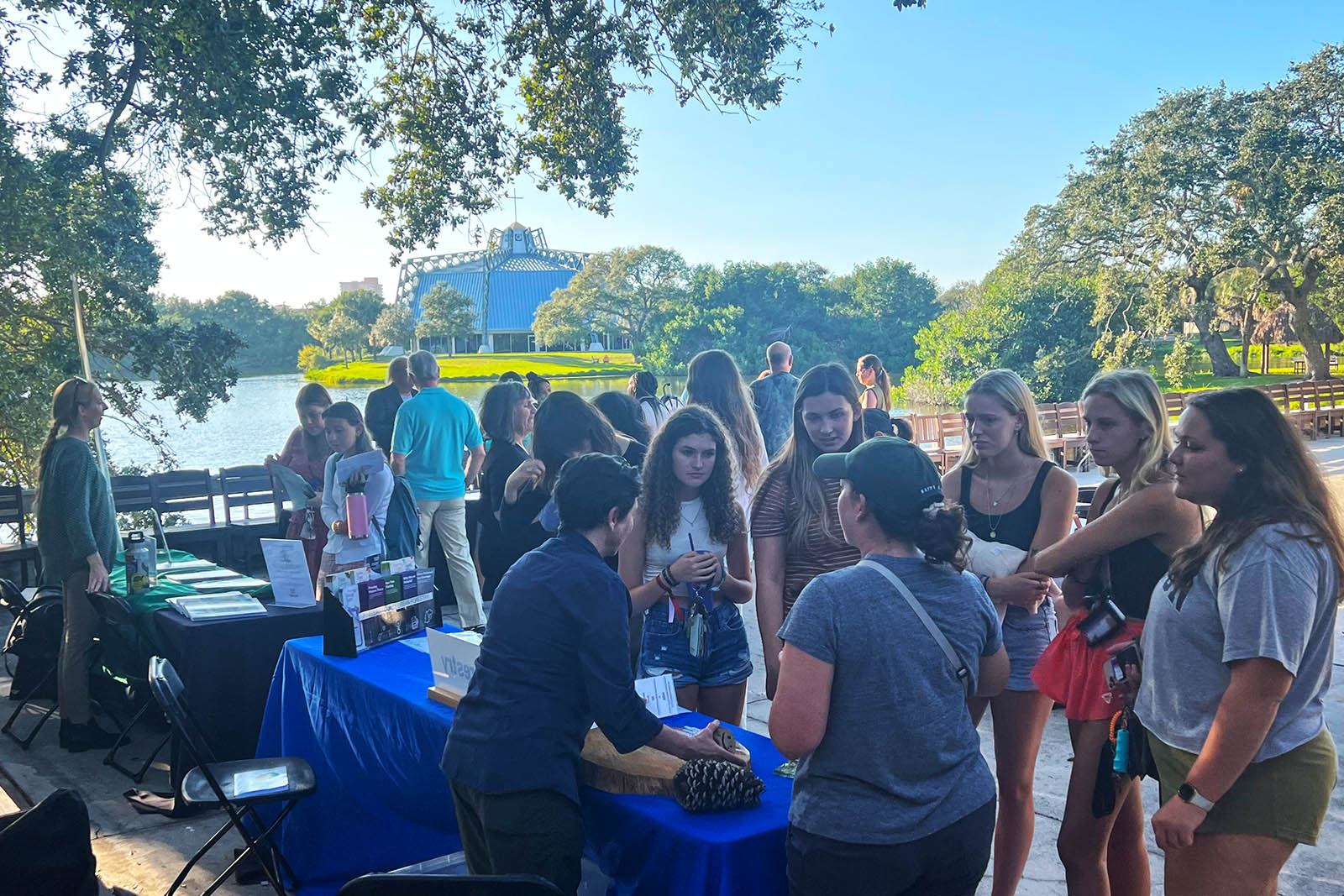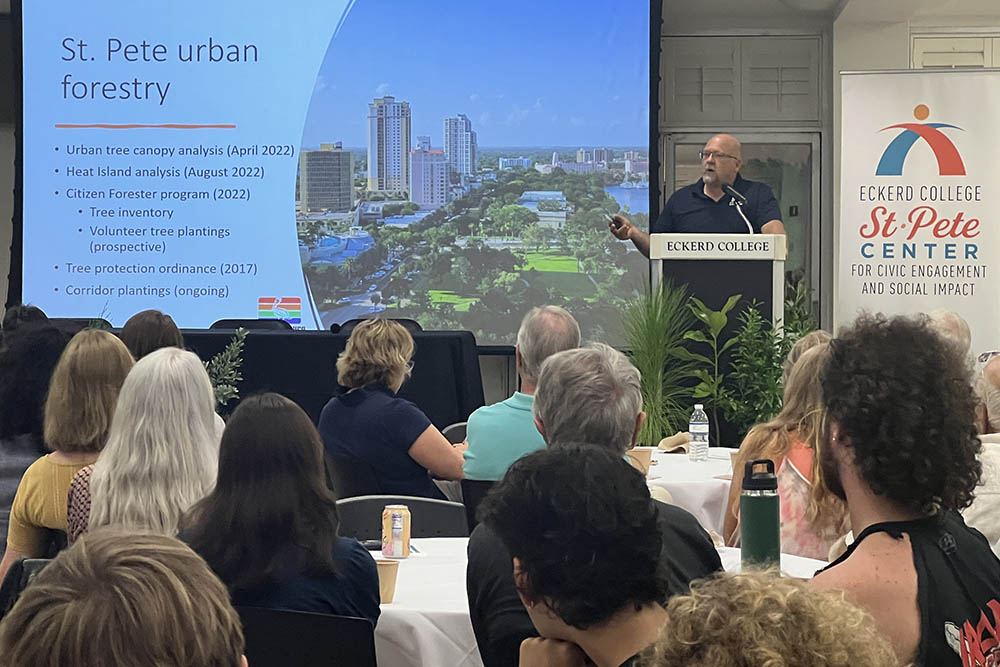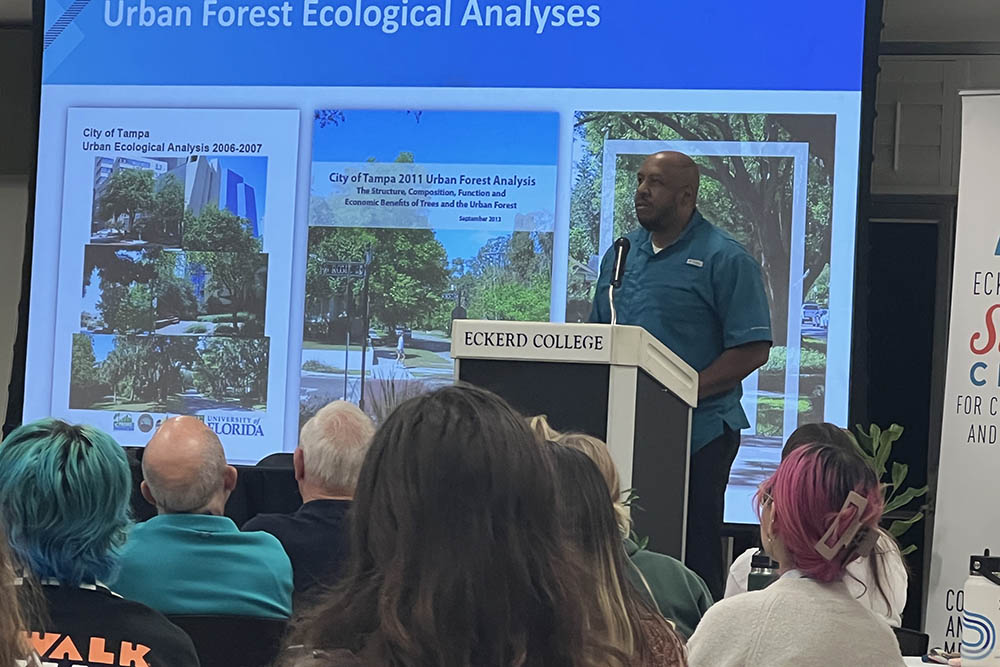On Tuesday, Nov. 1, students, experts and St. Petersburg, Florida, locals converged in Fox Hall at Eckerd College to direct their focus on the wonder of trees.
The room buzzed with appreciation as community members gathered over meatballs and veggie spring rolls at the Saving St. Pete—One Tree at a Time event and told stories about personal connections to trees. Junior biology student from Fort Collins, Colorado, Quinn Vogel told one such story.
“When my family moved to Colorado, we had to clear a big area of the property,” Vogel said. “I now have a tree from my family’s land growing in my room. When I look at it, it reminds me of my mom and the special connection we share.”
The Eckerd College St. Pete Center for Civic Engagement and Social Impact had asked faculty to submit community investment projects last spring and selected two projects to become the initial cohort of Faculty Fellows funded by the Center. Director of Digital Strategy and Communications Michel Fougères had dreamed of an initiative to increase the quality and quantity of canopy cover in the city, and through a partnership with Associate Professor of Environmental Studies Hilary Flower, Ph.D., and her team of student interns, it is slowly becoming a reality.
“You get trees in the ground through connections with people,” Flower says.
The goal of the St. Pete Center is to serve as a bridge between Eckerd College and the Tampa Bay–area community. The Center is a resource to foster relationships and create avenues of change, such as planting more trees in urban landscapes.
Deb Hilbert, with the Florida Urban Forestry Council, says her favorite part of her job is the welcoming community and relationships she’s built with people along the way. She graduated from Eckerd College with a Bachelor of Science degree in biology and environmental studies in 2013.
At the event, the panel of experts included individuals from government, nonprofit and commercial sectors to provide a wide scope of perspectives. Local organizations, including Keep Pinellas Beautiful and T.R.E.E. Inc., were there to promote their tree-planting projects around Tampa Bay. This panel event was a great success with more than 120 students and community members showing up and showing passion for the project.
Speakers from the government, nonprofit and commercial sectors included Cathy Harrelson, chair of the Urban Forestry Committee, City of St. Petersburg City Beautiful Commission, and president of the St. Petersburg Sustainability Council; Larry “Dean” Hay, board-certified master arborist, urban forester and sustainability coordinator, Office of Sustainability and Resiliency, City of St. Petersburg; Deborah Hilbert ’13, executive director of the Florida Urban Forestry Council; and Brian Knox, senior forester examiner, City Planning Department, City of Tampa.
One of the biggest challenges to planting more trees is community consideration. While trees provide countless benefits (they’re beautiful, provide shade and oxygen, and serve as habitats for assorted adorable creatures), there also are some implications that must be addressed. Planting trees takes careful planning. Fast-growing trees should be planted away from the house to prevent foundation damage. Planting trees in neighborhoods and backyards can cause unrest among residents because of concern for storm damage. If a bad storm were to roll through, which is common for the area, tall trees can become hazards. If they fall, they can cause terrible damage, especially to roofs. Trees also require a certain amount of maintenance. In low-income communities, this can add unwanted stress—financial and otherwise—to residents.
“It’s all about balance,” says Zoe Sabadish, a junior environmental studies and visual arts student from Pennsylvania. “We have to find a way to make people want to plant trees.”
Over the summer, Zoe had an internship with Associate Professor Flower working on the foundation of the Tree Team initiatives, where she and her colleagues had to do a lot of brainstorming and research to make this work.
“The project is still in its infancy,” Flower says. “We’re still developing it in collaboration with students.”

















